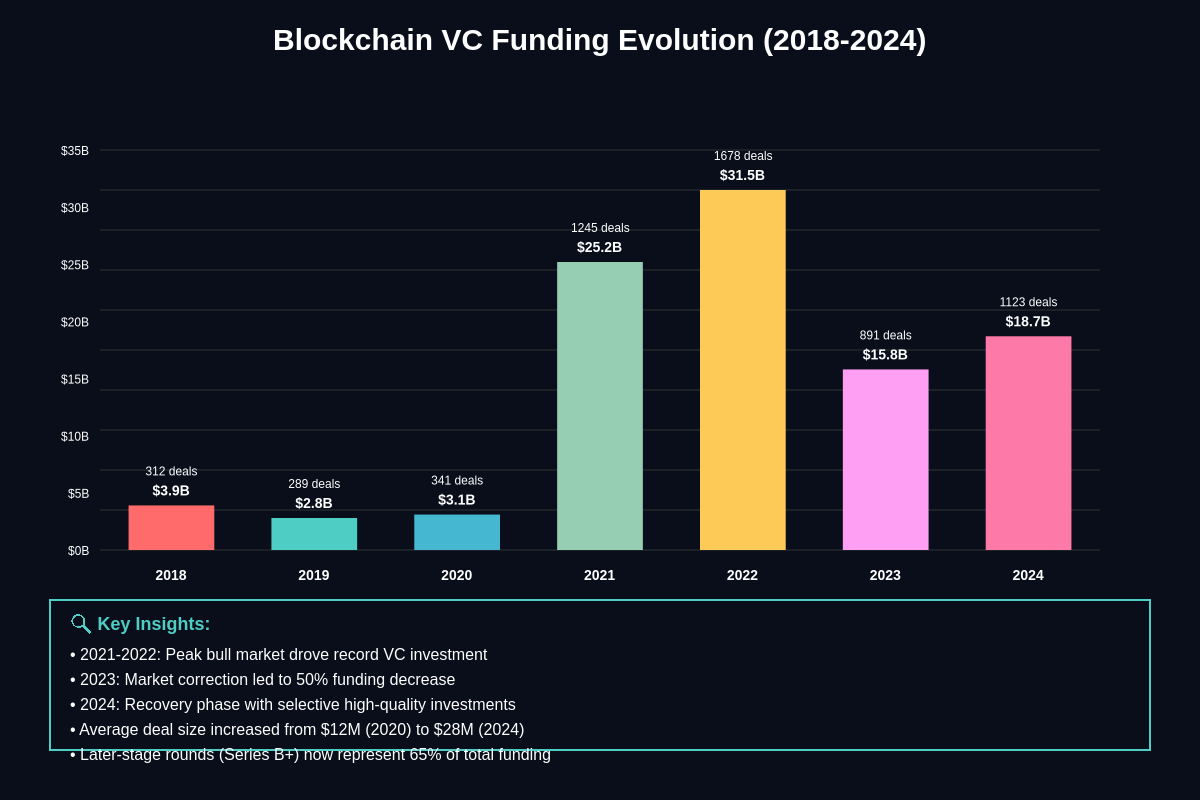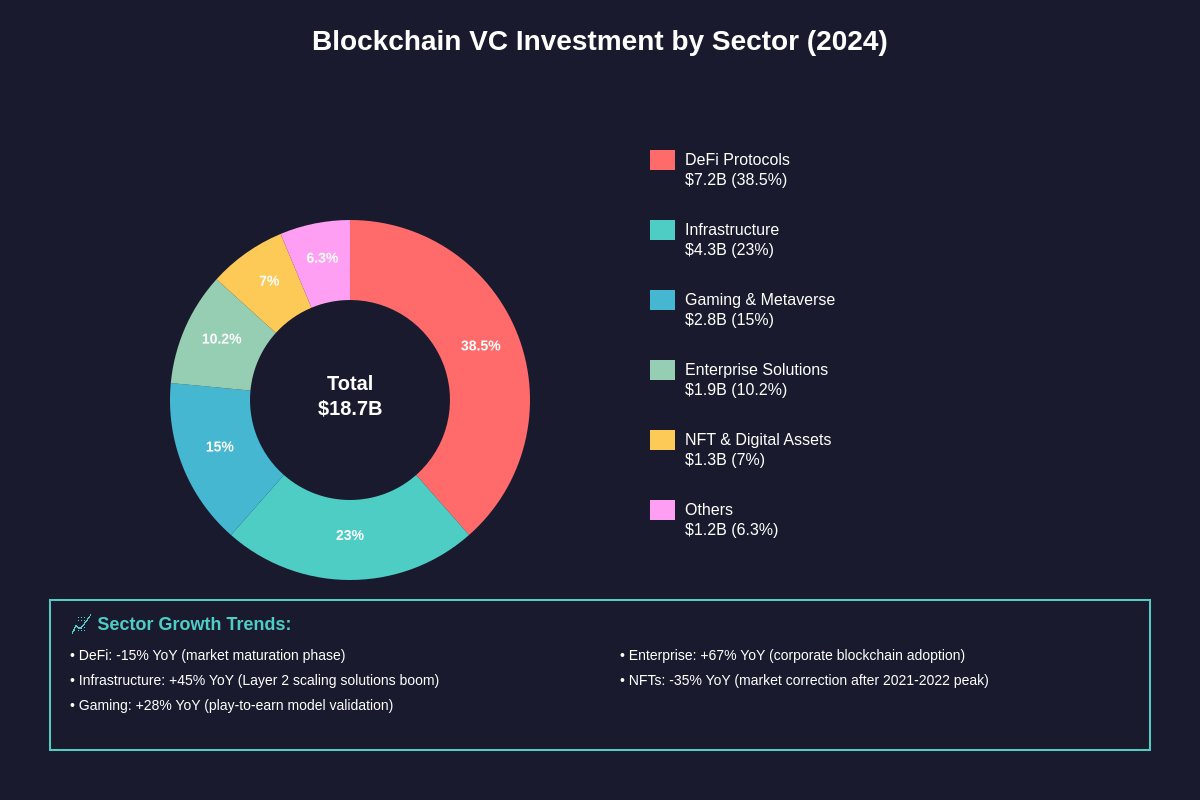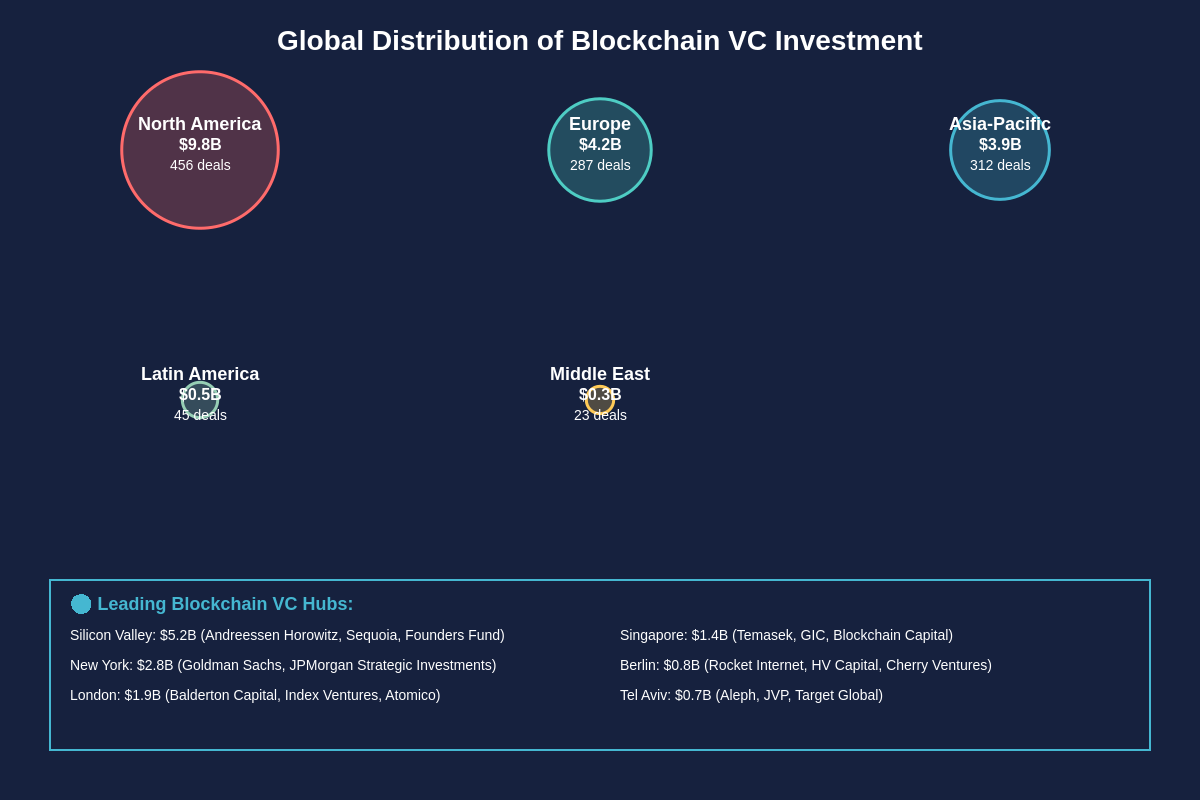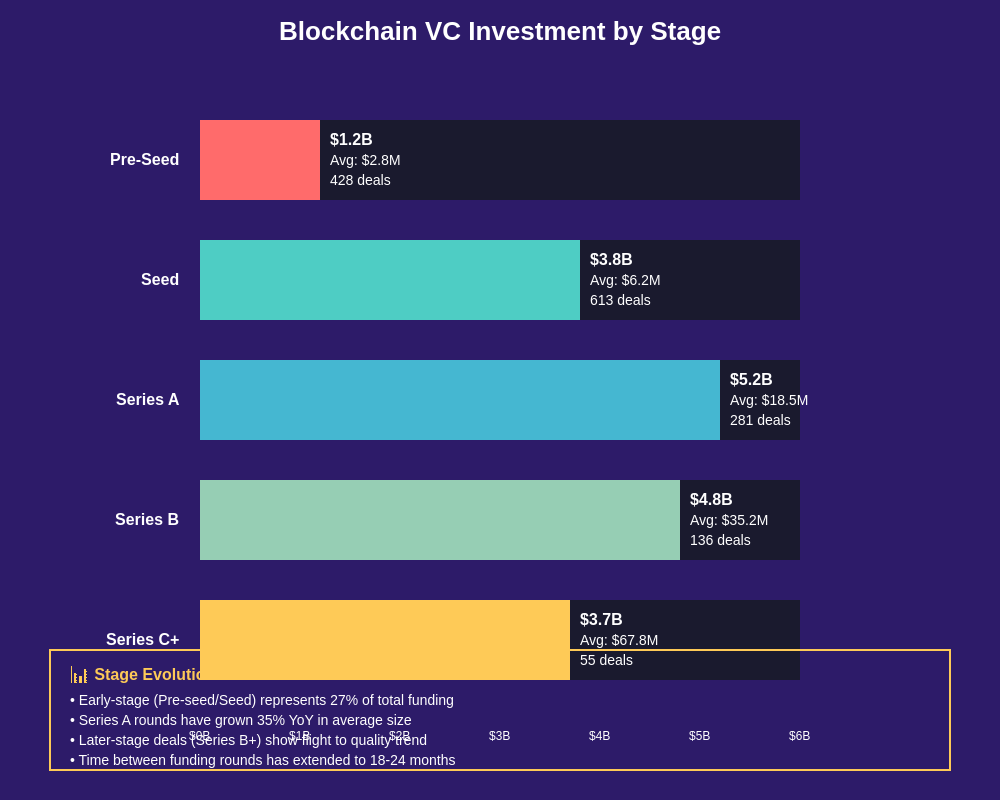The Evolution of Blockchain Investment Landscape
Advanced TradingView analytics demonstrate that venture capital investment in blockchain and cryptocurrency startups has undergone a remarkable transformation over the past decade, evolving from a niche interest among tech-savvy investors to a mainstream asset class attracting billions of dollars from traditional financial institutions, corporate venture arms, and sovereign wealth funds. The maturation of this investment sector reflects not only the growing acceptance of blockchain technology but also the recognition that distributed ledger systems represent a fundamental shift in how digital value is created, transferred, and stored across various industries.
The venture capital landscape for blockchain startups has experienced unprecedented growth, with total funding reaching record levels in recent years as institutional investors have overcome initial skepticism and regulatory uncertainty to embrace the potential of decentralized technologies. This shift represents more than just capital allocation; it signifies a fundamental change in how venture capitalists evaluate technology investments, with blockchain infrastructure, decentralized finance protocols, and Web3 applications now commanding valuations that rival traditional software companies while offering unique value propositions that were previously impossible to achieve.

Historical Investment Patterns and Market Cycles
The historical development of venture capital investment in blockchain startups reveals distinct phases that closely correlate with broader cryptocurrency market cycles, technological advancement milestones, and regulatory clarity developments across major jurisdictions. Early investment patterns from 2017 through 2019 were characterized by significant volatility, with funding levels fluctuating dramatically based on Bitcoin price movements and initial coin offering (ICO) market sentiment, creating boom-and-bust cycles that tested investor confidence and startup resilience.
The period from 2020 to 2022 marked a maturation phase where venture capital investment in blockchain startups became increasingly sophisticated, with investors developing more nuanced evaluation criteria that emphasized technical fundamentals, team capabilities, market addressable size, and regulatory compliance rather than simply following cryptocurrency price trends. Professional cryptocurrency market analysis tools became essential for investors seeking to understand the correlation between market sentiment and startup valuation metrics, enabling more informed investment decisions based on comprehensive data analysis.
The emergence of institutional-grade blockchain infrastructure companies during this period attracted significant venture capital attention, with firms like Coinbase, Ripple, and Chainalysis achieving unicorn valuations by demonstrating clear revenue models, regulatory compliance frameworks, and scalable business operations that could serve both retail and institutional clients. These success stories provided venture capitalists with concrete examples of how blockchain technology could generate substantial returns while addressing real market needs, paving the way for increased investment in subsequent years.
Current Market Dynamics and Investment Volumes
The contemporary venture capital landscape for blockchain startups is characterized by unprecedented investment volumes, with 2024 funding levels exceeding previous records despite broader economic uncertainty and tightening credit conditions affecting traditional venture capital markets. Total venture capital investment in blockchain and cryptocurrency startups has surpassed $30 billion annually, with average deal sizes increasing significantly as later-stage companies command higher valuations and require larger funding rounds to support global expansion and regulatory compliance initiatives.
Investment distribution across different blockchain sectors reveals interesting patterns, with decentralized finance (DeFi) protocols continuing to attract the largest share of venture capital funding, followed by infrastructure and tooling companies, gaming and metaverse platforms, and enterprise blockchain solutions. The diversification of investment across multiple sectors indicates that venture capitalists have moved beyond simple cryptocurrency speculation to recognize the broad applicability of blockchain technology across various industries and use cases.

Geographic distribution of venture capital investment in blockchain startups shows concentration in traditional technology hubs like Silicon Valley, New York, and London, while emerging markets including Singapore, Dubai, and various Latin American countries are experiencing rapid growth in both startup formation and investment activity. This geographic diversification reflects the global nature of blockchain technology and the recognition that regulatory-friendly jurisdictions can provide competitive advantages for blockchain startups seeking to scale their operations internationally.

Sector-Specific Investment Trends
Decentralized finance represents the largest single category of venture capital investment in blockchain startups, with DeFi protocols raising substantial funding rounds to develop lending platforms, decentralized exchanges, yield farming protocols, and sophisticated financial instruments that replicate traditional banking services in a decentralized manner. The sophistication of DeFi protocols has attracted investment from traditional financial institutions seeking to understand and participate in the evolution of financial services, creating unique partnership opportunities between established financial players and innovative blockchain startups.
Infrastructure and tooling companies have emerged as another major focus area for venture capital investment, with firms developing blockchain scaling solutions, interoperability protocols, developer tools, and security services commanding significant valuations as the industry recognizes the critical importance of robust infrastructure for supporting mainstream blockchain adoption. These companies often exhibit more predictable revenue models compared to token-based projects, making them particularly attractive to traditional venture capitalists who prefer familiar business metrics and evaluation frameworks.
Gaming and metaverse applications represent a rapidly growing segment of blockchain venture capital investment, with startups developing play-to-earn games, virtual worlds, NFT marketplaces, and digital asset trading platforms attracting both gaming industry veterans and traditional venture capitalists seeking exposure to the convergence of gaming, social media, and blockchain technology. The potential for these platforms to create entirely new economic models for digital entertainment has generated significant investor enthusiasm and substantial funding rounds for promising projects.
Regulatory Impact on Investment Decisions
Regulatory developments across major jurisdictions have become increasingly important factors in venture capital investment decisions for blockchain startups, with investors carefully evaluating regulatory compliance strategies, licensing requirements, and potential legal risks before committing capital to blockchain projects. The evolution of regulatory frameworks in the United States, European Union, and Asia-Pacific regions has created both opportunities and challenges for blockchain startups seeking venture capital funding, with regulatory clarity often serving as a key differentiator in investment decisions.
The introduction of comprehensive regulatory frameworks like the European Union’s Markets in Crypto-Assets (MiCA) regulation has provided greater certainty for venture capitalists investing in blockchain startups, enabling more sophisticated due diligence processes and risk assessment methodologies that account for regulatory compliance costs and market access restrictions. Professional regulatory tracking tools have become essential for venture capitalists seeking to monitor regulatory developments across multiple jurisdictions and assess their potential impact on portfolio companies.
Compliance-focused blockchain startups have attracted increased venture capital investment as regulatory requirements have become more stringent, with companies developing know-your-customer (KYC) solutions, anti-money laundering (AML) tools, and regulatory reporting systems commanding significant valuations from investors who recognize the growing importance of compliance infrastructure in the blockchain ecosystem. These investments reflect a broader trend toward professionalization and institutionalization of the blockchain industry as it matures beyond its early experimental phase.
Emerging Investment Themes and Technologies
Layer 2 scaling solutions have emerged as a major theme in venture capital investment for blockchain startups, with companies developing state channels, sidechains, rollups, and other scaling technologies attracting substantial funding as the industry seeks to address throughput limitations and transaction cost issues that have hindered mainstream blockchain adoption. The technical complexity and potential impact of these solutions have attracted investment from both traditional venture capitalists and blockchain-native funds seeking to support infrastructure development.
Zero-knowledge proof technologies represent another emerging area of significant venture capital interest, with startups developing privacy-preserving protocols, scalable computation systems, and identity verification solutions based on zero-knowledge cryptography attracting investment from venture capitalists who recognize the potential for these technologies to address privacy concerns while maintaining the transparency benefits of blockchain systems. The mathematical sophistication required for these projects has created a specialized investment niche requiring deep technical expertise.
Cross-chain interoperability solutions have become increasingly important investment targets as the blockchain ecosystem has evolved toward a multi-chain architecture, with venture capitalists funding startups developing bridging protocols, cross-chain communication systems, and unified development frameworks that enable applications to operate across multiple blockchain networks. The strategic importance of interoperability for the long-term success of the blockchain ecosystem has made these investments particularly attractive to forward-thinking venture capitalists.
Geographic Trends and Regional Preferences
Silicon Valley continues to dominate venture capital investment in blockchain startups, with established venture capital firms like Andreessen Horowitz, Sequoia Capital, and Founders Fund making substantial commitments to blockchain-focused investment strategies while maintaining their traditional focus on high-growth technology companies. The concentration of technical talent, entrepreneurial expertise, and venture capital resources in the San Francisco Bay Area has created a self-reinforcing ecosystem that continues to attract the most promising blockchain startups and generate the largest funding rounds.
New York has emerged as a significant center for blockchain venture capital investment, particularly for startups focused on financial services applications, institutional trading infrastructure, and regulatory compliance solutions that leverage the city’s established financial services ecosystem. The presence of major financial institutions, regulatory expertise, and substantial capital pools has made New York particularly attractive for blockchain startups seeking to bridge traditional finance and decentralized systems.
International markets have experienced rapid growth in blockchain venture capital investment, with Singapore establishing itself as a major hub for Asian blockchain startups, while London serves as the primary center for European blockchain investment activity. The regulatory approaches adopted by these jurisdictions have significantly influenced investment patterns, with venture capitalists often preferring to invest in startups located in jurisdictions with clear regulatory frameworks and supportive government policies toward blockchain innovation.
Institutional Adoption and Corporate Venture Capital
Corporate venture capital arms from traditional technology companies, financial institutions, and industrial corporations have become increasingly active investors in blockchain startups, bringing not only financial resources but also strategic partnerships, distribution channels, and technical expertise that can accelerate startup growth and market adoption. Companies like Microsoft, Google, JPMorgan Chase, and Visa have established dedicated blockchain investment programs that focus on startups developing solutions relevant to their core business operations.
The involvement of corporate venture capital in blockchain startup funding has created unique dynamics where startups must balance the benefits of strategic partnerships with the potential limitations of working closely with established industry players who may have conflicting interests or different timelines for technology adoption. Professional corporate partnership analysis has become crucial for blockchain startups evaluating corporate venture capital offers and assessing the strategic value of different partnership opportunities.
Sovereign wealth funds and government-backed investment vehicles have begun participating in blockchain venture capital investment, particularly in jurisdictions seeking to establish themselves as blockchain innovation hubs through direct investment in promising startups and supportive regulatory frameworks. These investments often carry additional strategic value beyond financial returns, as governments recognize the potential economic benefits of becoming early adopters and supporters of blockchain technology development.
Valuation Methodologies and Metrics
Traditional venture capital valuation methodologies have required significant adaptation for blockchain startups, as many projects operate with token-based economic models, decentralized governance structures, and revenue streams that differ substantially from conventional software companies. Venture capitalists have developed new frameworks for evaluating blockchain startups that consider factors like token economics, network effects, protocol adoption metrics, and decentralized autonomous organization (DAO) governance effectiveness.
Revenue-generating blockchain startups with clear business models have commanded premium valuations from venture capitalists seeking investments that align with traditional financial metrics and evaluation frameworks, while early-stage protocol projects require more sophisticated analysis of potential network value, token appreciation prospects, and long-term adoption scenarios. The development of blockchain-specific valuation methodologies has become a competitive advantage for venture capital firms seeking to identify and secure investment opportunities in promising blockchain startups.
Token valuation presents unique challenges for venture capital investors, as the value of utility tokens, governance tokens, and protocol tokens can fluctuate based on factors that extend beyond the startup’s operational performance to include broader cryptocurrency market sentiment, regulatory developments, and technical protocol changes. Successful blockchain venture capitalists have developed expertise in token economics and protocol design that enables them to evaluate the long-term value potential of token-based investments beyond short-term price movements.

Exit Strategies and Liquidity Events
Initial public offerings (IPOs) have become increasingly common exit strategies for mature blockchain startups, with companies like Coinbase, Robinhood, and Marathon Digital demonstrating that blockchain-focused companies can successfully navigate public market listing requirements while maintaining their focus on cryptocurrency and blockchain-related business operations. These successful public offerings have provided venture capital investors with clear examples of potential exit paths for blockchain investments and established precedents for public market valuation of blockchain companies.
Strategic acquisitions by established technology companies, financial institutions, and blockchain-native organizations have provided alternative exit opportunities for blockchain startups, with acquirers seeking to integrate blockchain capabilities into their existing operations or expand their market presence in the cryptocurrency ecosystem. The strategic value of blockchain technology has often resulted in acquisition premiums that provide attractive returns for venture capital investors while enabling acquirers to accelerate their blockchain adoption timelines.
Token-based liquidity events represent a unique characteristic of blockchain venture capital investment, where venture capitalists may receive tokens as part of their investment that can achieve liquidity through cryptocurrency exchanges before traditional exit events occur. This dynamic creates both opportunities and challenges for venture capital investors, as token liquidity can provide early returns while also introducing additional complexity in investment management and portfolio valuation.
Due Diligence Evolution and Risk Assessment
Due diligence processes for blockchain startup investments have evolved to incorporate technical audits of smart contracts, protocol security assessments, tokenomics analysis, and regulatory compliance reviews that extend beyond traditional venture capital due diligence procedures. The technical complexity of blockchain systems requires venture capital firms to either develop in-house blockchain expertise or establish relationships with specialized technical advisors who can properly evaluate the security and functionality of blockchain protocols.
Security considerations have become paramount in blockchain venture capital due diligence, with investors requiring comprehensive security audits, penetration testing results, and ongoing security monitoring procedures before committing capital to blockchain startups. The history of security breaches and protocol exploits in the blockchain ecosystem has made security assessment a critical component of investment decisions, with security vulnerabilities potentially resulting in complete loss of invested capital.
Regulatory compliance assessment has become increasingly sophisticated in blockchain venture capital due diligence, with investors evaluating startup compliance strategies, legal opinions, and regulatory risk mitigation plans across multiple jurisdictions where the startup may operate or serve customers. The evolving regulatory landscape requires ongoing monitoring and adaptation of compliance strategies, making regulatory expertise an essential component of successful blockchain venture capital investment.
Future Investment Outlook and Emerging Opportunities
The future outlook for venture capital investment in blockchain startups remains highly optimistic despite periodic market volatility, with continued technological innovation, expanding use cases, and growing institutional adoption creating sustained demand for blockchain solutions across various industries. Emerging opportunities in areas like central bank digital currencies (CBDCs), supply chain transparency, digital identity management, and decentralized social media platforms are attracting venture capital interest as investors seek to identify the next generation of transformative blockchain applications.
Artificial intelligence integration with blockchain technology represents a particularly promising area for future venture capital investment, with startups developing AI-powered blockchain analytics, automated smart contract systems, and machine learning-enhanced cryptocurrency trading platforms attracting investor attention as these technologies converge to create new capabilities and market opportunities. The combination of AI and blockchain technologies offers potential solutions to scalability, security, and usability challenges that have limited blockchain adoption in certain applications.
Environmental sustainability has become an increasingly important consideration in blockchain venture capital investment, with investors seeking startups that develop energy-efficient consensus mechanisms, carbon-neutral blockchain networks, and sustainability-focused applications that address climate change concerns while leveraging blockchain technology capabilities. The focus on environmental impact reflects broader investor priorities and regulatory pressures that are likely to influence blockchain development and investment decisions in the coming years.
Professional market research tools indicate that venture capital investment in blockchain startups will continue to grow as the technology matures and addresses current limitations while expanding into new application areas that can benefit from decentralized, transparent, and programmable systems for value transfer and storage.
Disclaimer
This article is for informational purposes only and does not constitute financial, investment, or legal advice. Cryptocurrency and blockchain investments carry significant risks, including the potential for total loss of invested capital. Market conditions, regulatory requirements, and technology developments can change rapidly and unpredictably. Readers should conduct their own research and consult with qualified financial advisors before making investment decisions. Past performance does not guarantee future results, and all investments involve risk of loss. The author and publisher assume no responsibility for any financial losses or damages resulting from the use of information contained in this article.